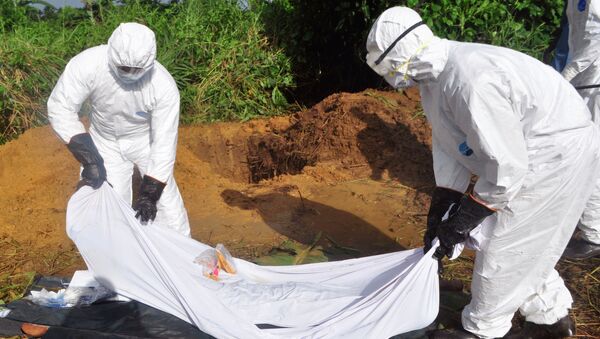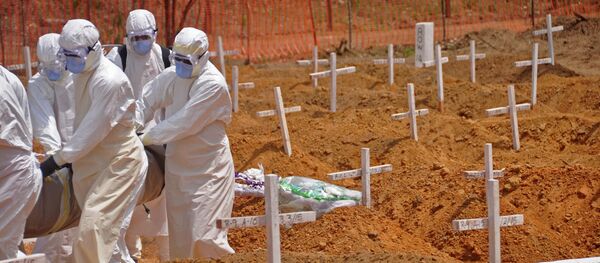MOSCOW (Sputnik) — Governments of Ebola-hit African countries and global health institutions have failed to act early and prevent the spread of the deadly Ebolavirus, Medecins Sans Frontieres (MSF) humanitarian organization said in a report published on Monday to mark the anniversary of the beginning Ebola outbreak.
The current outbreak of the Ebola virus disease started in December 2013 in Guinea and quickly spread to Sierra Leone and Liberia. On March 23, 2014 the World Health Organization (WHO) officially announced an outbreak. According to the most recent situation report, published by the WHO on March 18, the disease has killed more than 10,200 people, including 500 health care workers, and infected another 25,000. A total of 150 new confirmed cases of Ebola disease, 95 of them in Guinea, were reported in a week to March 15.
"For the Ebola outbreak to spiral this far out of control required many institutions to fail. And they did, with tragic and avoidable consequences," MSF Director General Christopher Stokes said as quoted in the report.
The 22-pages report titled "Pushed to the Limit and Beyond" is based on dozens of MSF staff who worked with Ebola-infected patients in Western Africa.
"Needless obstacles made responding more difficult for MSF teams, who were refused access to contact lists and had to start from scratch in determining which villages were affected and where and how to respond," the report said.
According to the MSF, the WHO in the African Region and its Geneva Headquarters should also have identified the scale of the problem earlier to mobilize more international staff to the region of the outbreak and to train more personnel on the ground.
"For months, ill-equipped national health authorities and volunteers from a few private aid organisations bore the brunt of care in this epidemic. There is something profoundly wrong with that," MSF's International President Dr. Liu said.
The MSF report said that even though the number of Ebola cases was in decline in 2015, there still much needs to be done. The outbreak of Ebola undermined normal functioning of health care services in Western Africa with children having missed their vaccinations and HIV patients having had their treatment interrupted. The global health organizations and aid volunteers need to prove they learned the Ebola lesson by introducing serious changes to their epidemic response standards.



